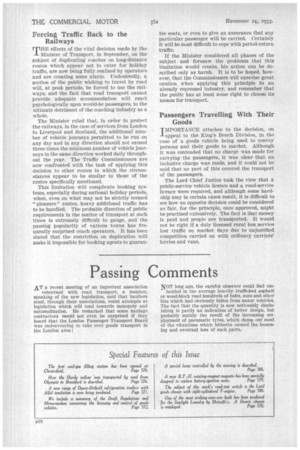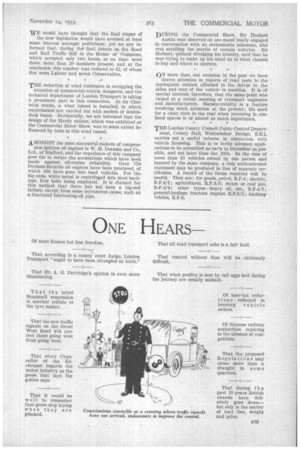Passing Comments
Page 28

Page 29

If you've noticed an error in this article please click here to report it so we can fix it.
AT a recent meeting of an important association
concerned with road transport, a member, speaking of the new legislation, said that hauliers must, through their associations, resist attempts at legislation which will tend towards monopoly and nationalization. He remarked that some haulage contractors would not even be surprised if they heard that the London Passenger Transport Board was endeavouring to take over goods transport in the London area! NOT long ago, the careful observer could find em
bedded in the average heavily trafficked asphalt or wood-block road hundreds of bolts, nuts and other bits which had obviously fallen from motor vehicles. The fact that the quantity is now noticeably diminishing is partly an indication of better design, but probably mainly the result a the increasing employment of pneumatic tyres, which damp out most of the vibrations which hitherto caused the loosening and eventual loss of such parts., WE would have thought that the final stages of the new legislation would have aroused at least some interest amongst politicians; yet we are informed that, during the' fincil debate on the Road and Rail Traffic Bill in the House of Commons, which occupied only two hours, at no time were there more than 20 members present, and at the conclusion this number was reduced to 12, of whom five were Labour and seven Conservative.
THE reduction of wind resistance is occupying the atieution of commercial-vehicle designers, and the technical department of London Transport is taking a prominent part in this connection. At its Chiswick works, a wind tunnel is installed, in which experiments are carried out with models of doubledeck buses. Incidentally, we are informed that the design of the Hardy railcar, which was exhibited at the Commercial Motor Show, was to some extent influenced by tests in this wind tunnel.
AMONGST the most successful makers of compres sion-ignition oil engines is W. H. Dorman and Co., Ltd., of Stafford, and the experience of this company goes far to refute the accusations which have been made against oil-engine reliability. Over 750 Dorman-Ricardo oil engines have been produced, of which 500 have gone into road vehicles. For the big ends, white metal is centrifuged into steel backings, four bolts being employed. It is claimed for this method that there has not been a big-end failure, except from some extraneous cause, such as a fractured lubricating-oil pipe. DURING the Commercial Show, Sir Herbert Austin was observed on one stand busily engaged in conversation with an enthusiastic salesman, who was extolling the merits of certain vehicles. Sir Herbert, Without divulging his identity, said that he was trying to make up his mind as to what chassis to buy and where to operate.
ON more than one occasion in the past we have drawn attention in reports of road tests to the inadequate outlook afforded to the driver to the sides and rear of the vehicle in question. It is of special interest, therefore, that the same point was raised at a recent meeting of transport engineers and manufacturers. Manceuvrability is a feature receiving much attention at the present ; the need for a clear view to the rear when reversing in confined spaces is of almost as much. importance.
THE London County Council Public Control Depart ment, County Hall, Westminster Bridge, S.E.1, carries out a useful scheme in connection with vehicle licensing. This is to invite advance applications to be submitted as early in December as possible, and not later than the 18th. In the case of more than 10 vehicles owned by one person and insured by the same company, a duly authenticated statement may be produced in lieu of separate certificates. A record of the forms required will he useful. They are: for goods, petrol, R.F.4; electric, R.F.4/1; agricultural, R.F.4/3; steam or coal gas, R.F.4/4; other types—heavy oil, etc. R.F.4/5; general-haulage tractors require R.E.5/1:; hackney vehiles, R.F.8.




















































































